#Margaret McDermott
Text
I wonder if Thomas ever kept anything from their victims.
Besides, ya know, their massive fortunes and trauma from their mother.
#crimson peak#thomas sharpe#Tom Hiddleston#edith cushing#mia wasikowska#Beatrice sharpe#Pamela Upton#Margaret McDermott#Enola Sciotti#lucille sharpe#jessica chastain
9 notes
·
View notes
Text

Margaret McDermott Bridge and the Reunion Tower in Dallas, Texas - colored drawing Framed Print
#dallas#bridge#margaret#mcdermott#cable-stayed#reunion#tower#observation#the#ball#highway#tx#texas#county#downtown#city#of
1 note
·
View note
Text
A Crimson Peak Timeline
(based on the art book, documents shown onscreen in the movie, and the character bios GDT wrote- where the bios don't contradict film canon. I've attempted to combine the two where contradicting elements are unavoidable.
Sometime during the reign of Charles II (1660-1685). Edward Sharpe created Baronet for services to the crown in providing clay for construction projects. Allerdale Hall built in the parish of Above Derwent, Cumberland, England.
1841. Carter Everett Cushing born the second son of six in an impoverished family that traveled the eastern US for his father's masonry business.
1863. Beatrice Alexandra Chetwynde, eldest daughter of a large, wealthy family, marries Baronet James William Sharpe. The marriage is contracted solely for the Chetwyndes' land, which adjoins the Sharpe estate.
April 1, 1865. Lucille Sharpe born.
Sometime between 1865 and ~1873. Carter marries 18-year-old socialite Eleanor Wyndham-Beckford, to the immense disapproval of her family. Though she is disowned and the couple struggles to make ends meet for years, Carter ultimately becomes a successful developer.
February 18, 1867. Thomas Sharpe born.
C. 1867-1872. The Sharpes employ a wet nurse- and later nanny -named Theresa, who would become the only adult to care about the children in their lives. She would ultimately be sacked after Beatrice caught young Lucille snuggling with her for warmth on a winter's night (on the grounds that a noble child should not be close with servants- a "crime" for which Lucille was beaten severely).
1876. 11-year-old Lucille murders her father with poison distilled from mine tailings, after he took Thomas on a hunting trip and left him in the woods to die of exposure.
Late 1876? A mining vein near Allerdale Hall collapses, killing several child mine-workers. I could have sworn I read somewhere that James foolishly dug a mining tunnel under the house shortly before his death, and that's what destabilized it, but I can't find it now.
October 9, 1877. Edith M. Cushing born, after Eleanor had suffered several miscarriages.
1878. Thomas and Lucille begin a secret sexual relationship.
Early August, 1879. Beatrice catches Lucille and Thomas together; Lucille murders her to keep their secret. The siblings try to run away together but are caught and brought back. Thomas is sent to live with an aunt and uncle in Whitehaven (who in turn send him to boarding school), while Lucille is forced into a mental institution.
Probably summer, 1885. Thomas finishes his schooling and rescues Lucille; they return to Allerdale.
1887. The Sharpe siblings travel to London seeking investors for Thomas' venture to reopen the mines. A wealthy, terminally ill gentleman, Major Richard Upton, takes a liking to Thomas and begs Thomas to marry his disabled daughter, Pamela. At Lucille's urging- since they're running out of both options and money -Thomas agrees. The two attempt to poison Pamela to death, but Lucille ends up strangling her instead.
Sometime between October 1887 and October 1888. Eleanor Cushing dies of cholera and appears to Edith as a ghost.
Early-mid 1890s. Carter and the recently widowed Mrs. McMichael have a brief flirtation that both Edith and Eunice oppose. Though it goes nowhere, the rift between the two girls is never healed.
Late October or November 1892. Edith (age 15) becomes infatuated with a 25-year-old poet who is having marital difficulties. After convincing Carter to hire him as a tutor, all unknowing, she confesses her feelings to him. He not only takes his leave of the Cushing family, but of Buffalo itself, quickly moving away with his wife and children.
1893. The Sharpes travel to Edinbrugh, where Thomas again finds no investors but does attract the attention of a 36-year-old widow of means, Margaret McDermott. Once again, he marries her and helps Lucille poison her, though she is ultimately killed via blunt force trauma.
Summer 1893. Edith asks her best friend, Alan McMichael, to kiss her so she can write about kisses more accurately. It means nothing to her, but sparks an unrequited passion in Alan
1896. Lucille falls pregnant by Thomas. He travels with her to Italy, which he loves and she despises. There he meets a wealthy woman named Enola Sciotti, widowed and bereaved of her only child, and decides of his own accord to marry and murder her in their usual fashion. The Sharpes and Enola return to Allerdale.
1897. Lucille is delivered of a son, who may or may not be sickly. Enola tries to care for her and the child, promising she can save him. The baby either dies of natural causes or Lucille smothers him under the conviction that his cries mean something is terribly wrong with him and he can't live- this is one contradiction in the bios vs. the movie that I prefer to leave vague, since it's possible not even Lucille remembers what happened. Either way, she blames Enola and dispatches her by unknown means. Thomas patents his excavating machine.
Late summer(?) 1901. Alan returns from studying medicine in London and sets up an ophthalmology practice in Buffalo. Edith's debut novel, Figures In The Mist, is rejected for publication by Oglivie and Sons. Thomas seeks investment in the mines from Cushing and Co., unsuccessfully. Edith and the Sharpes begin a friendship. Edith sees her mother's ghost for the second time.
September 14, 1901. President William McKinley dies after being shot at the Pan-American Exposition in Buffalo. I include this because the fact that the movie doesn't is hilarious to me.
October 21, 1901. At the Cushings' dinner party, Carter bribes the Sharpes to leave, instructing Thomas to break Edith's heart or he'll tell her about the marriage to Pamela. A deleted scene reveals that he was on the verge of relenting and investing in the mines when he read the private investigator's report.
October 22, 1901. Lucille murders Carter at his club, then departs to return to England. Thomas and Edith become engaged.
Late October-early November 1901. Thomas and Edith are married and travel to Allerdale.
November-December 1901 (possibly into early 1902?). The rest of the movie's plot.
59 notes
·
View notes
Text
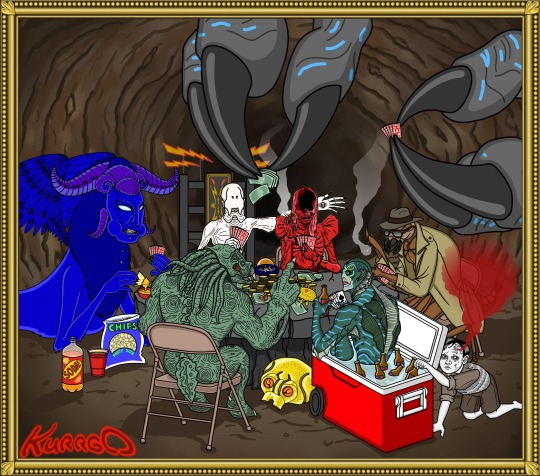
Well, this thing kinda got away from me. It was originally just going to be five of my favorite Guillermo del Toro monsters playing cards, but I kept thinking of more things to add until it got to the point were it felt weird not to go ahead and include something from all of his films. (I recently rewatched all of them, so I've kinda got this stuff on the brain right now) So, here we have:
The alchemist's device from Cronos (1993)
A giant roach from Mimic (1997)
Santi from The Devil's Backbone (2001)
The vampire overlord's ring from Blade II (2002)
Sammael from Hellboy (2004)
The Pale Man from Pan's Labyrinth (2006) (greatest movie OF ALL TIME)
The head of a Golden Army soldier from Hellboy II: the Golden Army (2008)
A kaiju from Pacific Rim (2013)
Margaret McDermott (I think) from Crimson Peak (2015)
The Amphibian Man from The Shape of Water (2017)
The electric chair prop from Nightmare Alley (2021)
Death from Pinocchio (2022)
#my drawings#guillermo del toro#cronos#mimic#the devil's backbone#blade ii#hellboy#pan's labyrinth#el laberinto del fauno#pale man#hellboy ii: the golden army#pacific rim#crimson peak#the shape of water#nightmare alley#pinocchio#digital art
26 notes
·
View notes
Text
DAMMIT: I.I
On AO3
SUMMARY: Two suicidal old men with moral scrupulosity in a three-legged potato sack race towards domesticity. Dallas 2014/Brick crossover, all adaptation decisions arbitrary.
Note: Stylistically? A disaster. Structurally? Also a disaster. Plot? God, no. Posting schedule? I'm working on chapter 3 when all that exists of chapter 2 is a brief note about insurance as a hurdle to appropriate SNF placement. Every time I have a craft question my answer is "you only write once" (and you don't have a beta, either). Godspeed, reader.
⁂
The smell of Betadine—ah, Christ! He should’ve picked a higher bridge. But—was it predictable? After a lifetime believing himself on an unassailable height, here he is: still a poor judge of distances.
⁂
Jean Valjean cannot rest. He is the animal brought to ground, heels damped by the hot breath of its hunter, who feels in its trembling breast the urge to turn and receive those terrible exhalations on its face. On the second day, he hears the noise of wheels in the driveway and waits in satisfied despair for the siren’s whoop. It is Cosette. He becomes prey of a different kind, now, to the questions she won’t ask of him, and the questions she waits for him to ask. What he offers, with his whereabouts during the riot a Charybdis and her history with the boy a Scylla, is to pretend they have already passed through this Strait of Messina, and beat oars in open waters: that is, he asks: “How is he?”
And so she chatters about Marius’ health with no acknowledgment that he has ever been her secret, or that her papa has uncovered it without her consent. He would rather a police interrogation. As when a particle catches the sun as it sinks into deep waters, so there is for him the flash of awareness that the silences are—what?—the particle is gone, and the illumination too fleeting; the man remains uneasy, but unenlightened; he ascribes his uneasiness to the buried topic, and not its burying.
They smile for each other, when she leaves for hospital visiting hours. Her embrace is tight and makes his sore muscles wake and moan, to which he gives no voice. Alone again, Jean Valjean falls to brooding. He fetches his phone.
Crowd control for the protest drew resources from all the surrounding precincts, so it takes three calls before he is told—Yes—Officer Javert?—Yes—well, not today; he’s not in today. When—? Well—! You’re a friend of his…? You didn’t hear—? He hangs up, hasty and less polite than is fair. Sweat on his hands makes the touchscreen of his phone half-unresponsive, B ylor h pital n m er, but it’s enough for Google to bring it up. The receptionist wants to know the patient’s full name, sir, and what about his date of birth?
He’s more polite this time, sorry, take care, thank you.
Jean Valjean does not ask for favors. He makes a call anyway. One might wonder how Father Herbert manages the confessional—might imagine him exclaiming You did what! in answer to a parishioner’s sins—and the man shows no unusual subtlety in his expressions of shock that Jean Valjean should make a request of him, but he’s willing all the same. A priest is due his flock even under the rules of HIPAA, and Valjean has remembered rightly that Javert is Catholic. Father Herbert texts him the room number in the evening.
Cosette does not visit him the next day, thoroughly caught up in that boy, for which he tells himself he’s glad. He does not know how he would explain going to the hospital, or Javert, or the possible consequences, and expects he would remain silent even in her presence, which he knows to be an unkindness. Traffic is slow across the Margaret McDermott, the road rain-wetted and fog heavy on the face of the river, though the storms passed with the morning. He claws his fingers into the steering wheel, notices, releases them with a shock. It’s all of fifteen minutes—is that not close enough?
He will not recall later where he parks, or the route he takes to the correct unit.
The charge nurse recognizes him from Baylor’s yearly blood drive, and she alarms him with a warm greeting—he doesn’t like the recognition. Doesn’t want to trade on it. Does so. “Aileen,” he reads off her name tag. “So good to see you.” Pleasantries. Apologies. He is not present in himself even as he speaks and listens. There’s a man—yes, very sick, to be on this unit. No, not family. No one who would list him on their advanced directive, no. But, could he—?
The name loosens her uncertainty. “Ah, that guy. I shouldn’t tell you—well. I don’t count a uniformed officer as a visitor, so I say he’s had none. You’re not close? Well, you’re kind. Is he normally so—I mean—is it the situation that has him…?”
When it becomes clear she wants badly to know, he offers a smile of the saddest species.
“Never mind,” she replies, in the tone of one who understands. She might think that being a suicide has maddened Javert, or that he has always been a bastard, but in either case she is satisfied. “I’ll show you to him.”
Thirteen years gone, and the sounds of the hospital are still just echoes of Fantine’s last days. For all he saw the man days ago he expects the Javert of then: hair still more dark than gray, in uniform, sidearm in his hand—braced in a doorway, terrible in joy—struggling up from the floor with blood on his face. It is a shock when he is none of these things, but a long lank mass of flesh in a hospital bed. His sheets are rucked down and his gown rucked up, revealing the blued ladder of ribs, sick yellowish belly, curve of purple-mottled buttock, and there low on his pelvis the disconcerting glare of a lopsided wolf tattoo. His modesty is preserved as much by Valjean’s refusal to see as by fabric. Aileen tsks and sets him right.
“He’s on fifteen minute checks, I swear,” she says, in a tone which indicates the swear she means is fuck.
Javert speaks, and though the volume is low, the words confused, the voice is familiar. Comfortingly? No; but it is good to know that in this abased body there is yet the spirit of the man, fractious.
“Well, it’s good of you to have left your lines alone,” Aileen returns, tartly. “Now, look, Ultime is here to see you.”
“Ultime,” he spits, as if the name is vile in his mouth. He has never heard it, or in any case never in the context of Jean Valjean. Evidently he retains his ability to be hateful over nothing. The curiosity that seemed equally elemental to the man—that has quitted him; he does not turn his head.
Aileen moves the visitor’s chair forward and, with a wry smile, leaves. To sit at his ease seems impossible, but to hover—the uncertainty does not suit him. He has not come here in fear. He sits. For some time they are quiet together. Jean Valjean ventures, at last, to say the man’s name.
Javert’s head moves loosely on his neck; his gaze lacks astonishment, his lips are pursed. “Again,” he mutters, as if to himself. “Sure. Why not!”
Black reverie has brought Jean Valjean to this hospital room, not thought. The unpleasant process of waking begins.
“When I looked for you—where were you?—nowhere. Well, in custody already, dead, whatever. I’d get over it. Then you’d turn up underfoot like a fucking LEGO piece. Or like a—a rock in your shoe, but when you take the shoe off and shake it, nothing comes out—and you put it back on—and the rock is still there.” The hands he frees from underneath the blanket shake. He does not seem to know what he meant to do with them; they grasp at nothing. “Here you are, then, even though I don’t have my shoes. So! what do you want?”
“You said you would wait,” he says.
“I lied, evidently.” His face is swollen—not bruised, but retaining fluid—and the effect is unkind. The grimace he makes would have been awful of itself. “I didn’t think, when I said it—I didn’t think about lying. You had nowhere to run. What does that matter, though? I did the running. Didn’t expect you’d chase, though. Are you gloating? No; my instincts are all wrong. Here to dispense kindness, that’s what it is. Going to pay my hospital bills? Don’t bother. Those are a dead man’s debts, and there’s no next-of-kin who will have to pick up the tab.”
Jean Valjean waits for Javert to ask another question for himself to answer. The memory is faint—he recalls mostly how it felt to watch from outside himself as he was denounced and saved and damned, and it has been over a decade—but he recalls that in an extremity of emotion this man does not need a partner to converse. Can’t remember the words spoken, only the sense: Ah, this is very strange. On the second iteration, it is still strange. He is less annoyed, now. He has nowhere to be.
“Well?” asks Javert.
“Ah,” says Jean Valjean. This proves inadequate to draw a response. He admits, “I don’t understand you or your actions.”
In a low, aching voice, Javert says, “I couldn’t see the river.” He pauses for a long while, then goes on, “I let you go, you son of a bitch. I felt my fingers open. In fact—I never touched you. God, God, I’m embarrassed. I’m like a dog licking your fucking criminal hand. Do you feel it?”
“What?” Jean Valjean remembers the man’s touch on his shoulder, forebears to mention it. “No.”
“Pay attention.” Javert looks into Jean Valjean’s face with the eyes of a man who stares directly into the sun, pupils gone to nothing. It is the opiates. It should be very easy to tell what color his irises are, but under the terrible hospital lights they seem to be no color at all. “I can’t breathe.”
Jean Valjean looks with some concern at the monitors, which tell him that Javert’s ox-sat is at ninety-eight percent.
“You want to know why I have done it? There is something beyond duty,” Javert whispers to him. “I think it may be named mercy. Or mercy is a part of it.” His face, not being made for grief, looks instead furious, even as he begins to weep. “I don’t know. I feel it, but I don’t understand. Ah, no! I do know—you should have shot me. I should have yelled for those boys to shoot me.”
“You aren’t making sense,” Jean Valjean says. Despairs.
“You would know,” snips Javert, “about not making sense. You’ve fucked sense.”
Jean Valjean watches the compressed peaks of the man’s heart rate and wonders if he should fetch a nurse.
“Fucked it,” Javert mutters. Then he clasps his hands over his breastbone in an attitude of dignity, for all his wretched expression, his tears. “Go on, then. You aren’t arrested, are you? I can’t arrest you, anymore. I accomplished that much—wrong kind of termination, but it’ll do, for now.” He adds, with the tone of those who are deeply in the fog of drugs but have briefly found themselves in a place of clarity, “Actually, I doubt the paperwork is cleared yet, but functionally I am not an officer anymore.”
“I see why there are fifteen minute checks.”
“They are fair,” Javert agrees. One of his hands moves to touch his ribs, flutters, settles. Their rise and fall is uneven from emotion or injury.
They sit in silence until the nurse comes for the check, but she only glances with surprise at Jean Valjean before withdrawing. He is glad; he has never taken it well, how they would drug Fantine out of her grief to better manage her. He is, also, not glad: it seems there should be relief for the terrible pain on this man’s face, which he understands to be connected to himself—how else, with those eyes fixed on him?—yet beyond any ability of his to touch. Is this the time for a discourse on suicide? It is a sin, and he is not unread on the topic. Yet it seems cruel and obscurely unfair to bring the shade of Judas Iscariot to this room.
The silence, the smell of sickness, the grieving glare.
“So,” says Jean Valjean, “no APB, then?”
“No.”
“That’s good of you,” Jean Valjean lies, who thinks it the act of a madman.
This impression is not alleviated when Javert begins to laugh, waxy face flushing red. “I know,” he gasps. “It’s terrible.” He gags, chokes, he’s hurt himself.
With guilt-ridden relief for the interruption, Jean Valjean presses the call button.
⁂
How intolerable, to be alive and visited by fools.
First that boy, Grosch, who proves they will put anyone in uniform these days—yes, he’ll even think poorly of his fellow officers; that’s what he’s become. Who pushed you, sir?—an idiot’s question. We’ll find them. There isn’t even satisfaction in the memory of his response when Javert declared “he’s here!”, as Grosch had the temerity to be confused rather than shocked, What do you mean, sir? Then the verbal fumbling, offensive questions—why does the precinct even pay for sensitivity training, when the officers absorb so little of the lessons? Disgraceful.
Then—Valjean. But he does not have the right to call the man a fool, does he? He’s the one who lacks understanding. Probably. His opinion wavers. The thought comforts him that there will be no repeat of the visit, since the experience was surely as unpleasant for Valjean as for himself.
He ought to know the world contains no comfort. Not the next day—he is aware of a second surgery, if unsure of the specifics—not, he thinks, the next either—and here’s the nurse bitching at him about his IV line before she says, “Your friend has come to visit again.”
Those white curls bother Javert. The man’s official description still identifies him as gray-haired; the change dates from after his second arrest. He holds a tablet, an iPad, one of the new thin models, with which he fiddles as he sits down. “Hello, Javert.”
He provides an appropriate pause for a response, but there are too many words pressing at the inside of Javert’s skull, and inconveniently none of them are the man’s current alias. A sniveling part of him wants to say Mr. Madeleine, that name which represents something simpler, if little less painful.
Apologetic, Valjean goes on, “I heard you didn’t have many visitors. I thought nobody might have been by to drop off anything for you to do. I remember how bored—ah. I know how boring hospitals can be.” He holds out the tablet.
“Goddamnit,” Javert says.
2 notes
·
View notes
Text
«Le suore frustavano col rosario i bambini in orfanotrofio e li costringevano a mangiare il loro vomito»
Recitare preghiere e avere tra le mani un rosario non rende cattolici e tantomeno brave persone. L’esempio lampante dell’abito che non fa il monaco è la carcerazione di due suore di 79 anni, accusate di aver abusato di numerosi bambini in un orfanotrofio.
Per la legge scozzese le suore Sarah McDermott e Eileen Igoe, e l’inserviente Margaret Hughes, di 76 anni, sono colpevoli di maltrattamenti su…
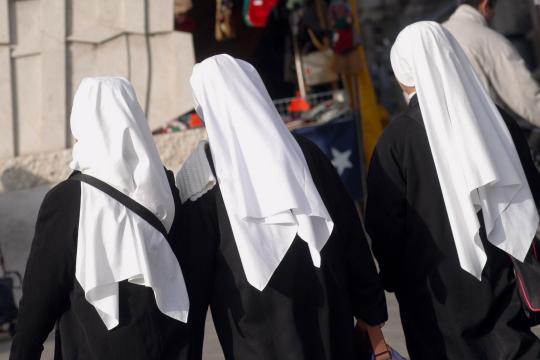
View On WordPress
0 notes
Text
More psychopathic abusers operating under the cloak of organized, Christian religion!
By Stanley Collymore
Sickeningly, religious hypocrites:
so-called Catholic nuns Sarah
McDermott, Eileen Igoe and
attendant likewise with their accomplice
career Margaret Hughes, systematically
and rather unconscionably, egregiously
and very malevolently, abused multiple
generations of children, over the years
and in their care at the institution they
were responsible for at Smyllum Park
in Lanark, Scotland, and basically too
for which they've obviously distinctly
only now, been effectively and rather
significantly clearly prosecuted, also
found guilty and crucially sent to jail
for a derisive, three years each! This
basically at a time when the current
Pope is pathetically and undeniably
irrelevantly too, simply spouting off
about the evil sins, of pornography!
Collectively, these evilly bloody
hypocrites have continued to
obviously effectively ensure
that organized religion, and specifically
Catholicism, within the basically white
western world is undoubtedly actually
simply even much more, about actual
power, money and distinctly absolute
control, and quite realistically bugger
all about any actually laudable literal
authentic welfare specifically clearly
relative to unquestionably, obviously
essentially crucially ordinary human
beings; and crucially, specifically so
young, vulnerable and very helpless
children. Which quite angrily clearly
puts me in a mind to say, that all of
these very alleged religious and so
unconvincingly caring scum ought
to be arbitrarily, simply rounded up
and just as uncaringly significantly
and obviously quite systematically
hurled off to their very appropriate
brutal deaths, from discernibly the
most perilous cliffs, known about!
(C) Stanley V. Collymore
18 January 2024.
Author's Remarks:
More scandal, invariably covered up, and obviously sickeningly, within the Catholic Church; who would have guessed it?
0 notes
Link
1 note
·
View note
Photo
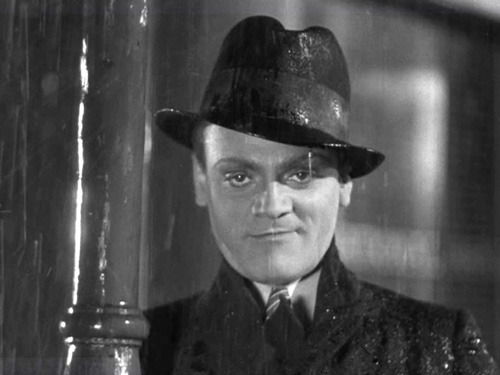
James Cagney in The Public Enemy (William A. Wellman, 1931)
Cast: James Cagney, Edward Woods, Jean Harlow, Joan Blondell, Donald Cook, Leslie Fenton, Beryl Mercer, Robert Emmett O'Connor, Murray Kinnell, Mae Clarke, Mia Marvin. Screenplay: Kubec Glasmon, John Bright, Harvey F. Thew. Cinematography: Devereaux Jennings. Art direction: Max Parker. Film editing: Edward M. McDermott.
James Cagney has always seemed to me the movies' greatest loner, and the film that made him a star bears that out. The scene that brings it home for me is the one in which Cagney's Tom Powers is hiding out from the rival mob, and the woman named Jane (Mia Marvin) who looks after him gets him drunk and seduces him. In the morning, when he remembers that they had sex, he's shocked and slaps her, then storms out of the hideout. It's a less famous scene than the one in which he shoves a grapefruit in Mae Clarke's face, but that's partly because the scene with Jane was cut by the censors after the Production Code went into effect; it was restored only after the movie made it onto video. The two scenes are similar in suggesting that although Cagney's characters aren't exactly chaste, they don't connect with women except for their mothers, like Beryl Mercer's Ma in The Public Enemy or Margaret Wycherly's Ma Jarrett in White Heat (Raoul Walsh, 1949). Almost every major leading man of the 1930s and 1940s can be identified with his on-screen teamwork with a leading lady (or two): Cary Grant with Katharine Hepburn, Spencer Tracy likewise, James Stewart with Jean Arthur or Margaret Sullavan, Clark Gable with Jean Harlow or Joan Crawford, Gary Cooper with Barbara Stanwyck or Marlene Dietrich, and so on. But Cagney never struck sparks with any of his leading ladies. He seems too coiled and defensive to give up any part of himself to a woman. In The Public Enemy, he's matched with Harlow, who does her best to thaw him out, but their scenes are not particularly memorable. In his private life, Cagney was notable for having married only once and having stayed married from 1922 till his death in 1986, without rumors of extramarital dalliance, something of an anomaly in Hollywood. The Public Enemy uses this enclosed quality of Cagney's to good effect, and it's a tribute to whoever made the decision to give him the lead -- claimants include director William A. Wellman and producer Darryl F. Zanuck -- after initially casting him in the secondary role of Matt Doyle, played by the now mostly forgotten Edward Woods. It's largely thanks to Cagney that The Public Enemy still hold up today, even though it has some of the stiffness and uncertainty of early talkies, especially when it comes to dialogue. Robert Emmett O'Connor, for example, who plays Paddy Ryan, tends to introduce long pauses between sentences when he's delivering his lines, as if afraid that the audience won't keep up with what he's saying.
1 note
·
View note
Text
Uk News Elderly woman with agoraphobia says she was 'forgotten' by Covid home vaccine scheme United Kingdom news
PremierLeague-News.Com - Margaret McDermott, 74, received the first two Covid jabs at home, but says she heard nothing about her boosters despite repeated phone calls. She is concerned housebound people like her are slipping through the net
from PremierLeague-News.Com - Premier league breaking news, premier league https://ift.tt/3IQodk7
0 notes
Note
Who was hidden in the vat under the house?
There are actually several people hidden in the vats under the house, but the one that comes to the surface after Edith went poking around in the vat would be Margaret McDermott, Thomas' second wife.

#Margaret McDermott#thomas' sharpe's second wife#ghost#ghosts of crimson peak#crimson peak ghost#anon#q&a
16 notes
·
View notes
Text
Thank you so much @littlegoldenflies for the lovely gift! Margaret McDermott now sits on my shelf and has been added to vast collection of creepy trinkets!

#crimson peak#Margaret McDermott#ghost#guillermo del toro#art#spooky#gothic romance#beware of crimson peak
38 notes
·
View notes
Text

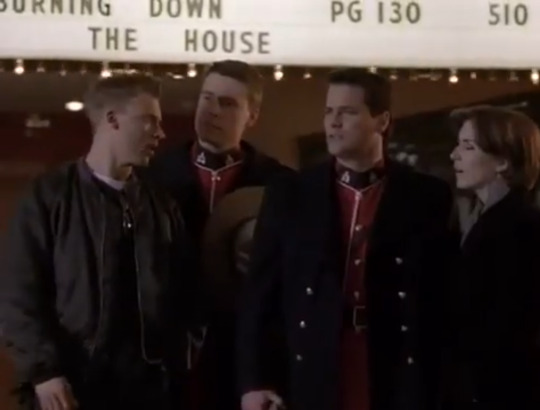
Just noticed these details whilst rewatching S04E10 'Say Amen'...
#the scientist speaks#due south#these screenshots are from my phone#so even more potato quality than usual#:')#who's idea was this though?#very funny#i appreciate#s04e10#say amen#paul gross#benton fraser#callum keith rennie#ray kowalski#dean mcdermott#renfield turnbull#camilla scott#margaret thatcher#my screencaps
61 notes
·
View notes
Photo
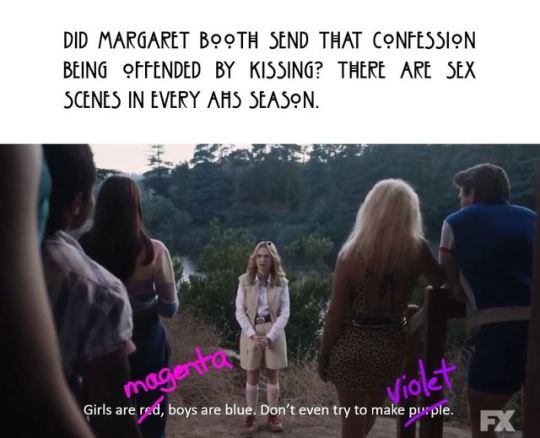
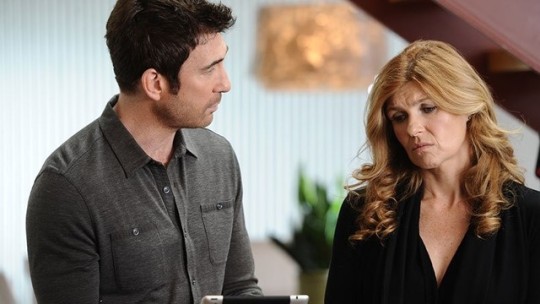
#ahs 1984#american horror story#ahs confessions#leslie grossman#margaret booth#slashers#violet harmon#the harmons#ben harmon#dylan mcdermott#vivien harmon#connie britton#ahs murder house
40 notes
·
View notes
Text
1984 THEORY
so ive been thinking, we all know Dylan McDermott is making an appearance at some point this season and ive seen so many posts about how he might be reprising his role of Johnny Morgan aka the next bloody face. but like, it is actually such a realistic guess because it says that Margaret bought Briarcliff and then she mentions something about a client who is making “faux” human skin lampshades. idk it might be ryan just teasing us but i would be so down for a tie in to Asylum.
#AHS#american horror story#ahs 1984#ahs asylum#dylan mcdermott#bloodyface#leslie grossman#margaret booth#ryan murphy
17 notes
·
View notes